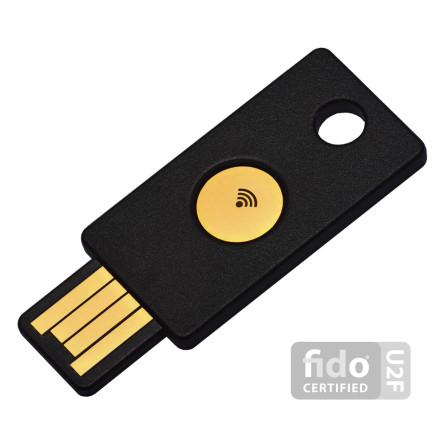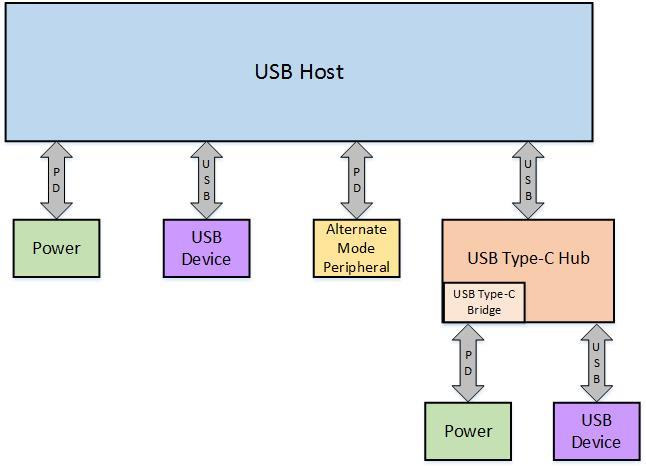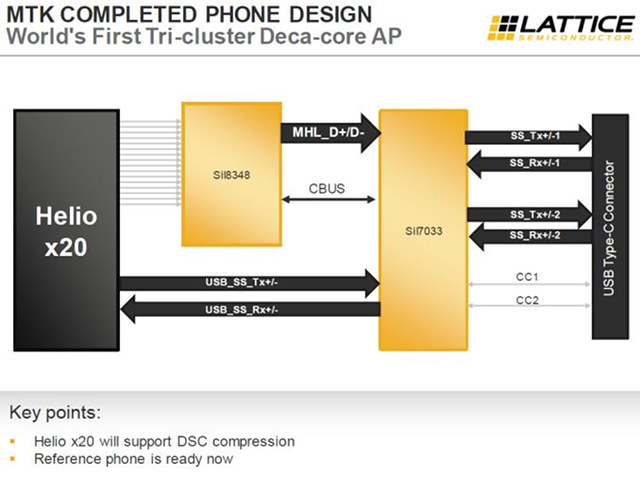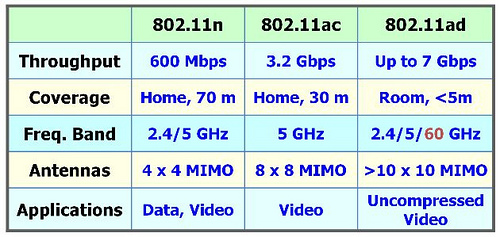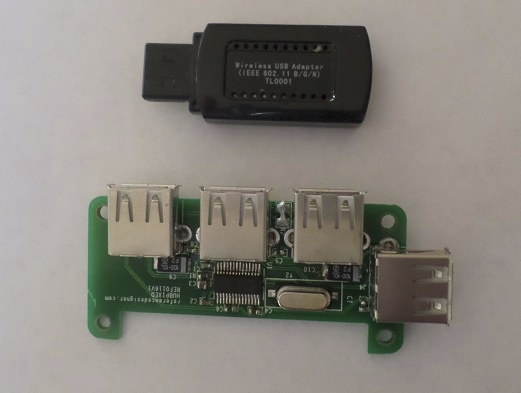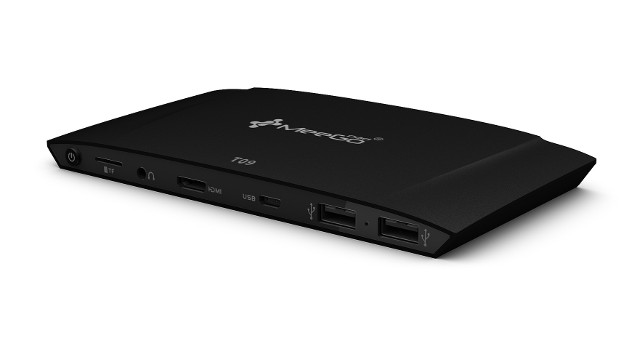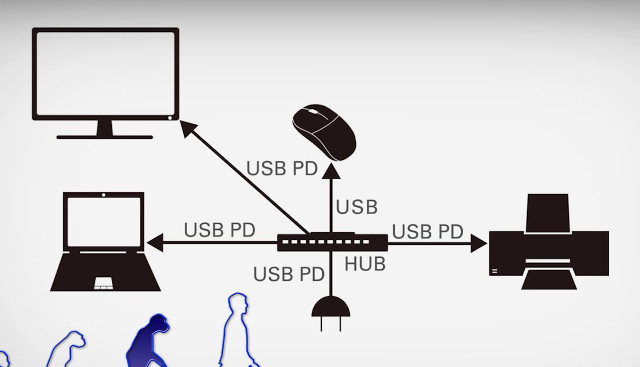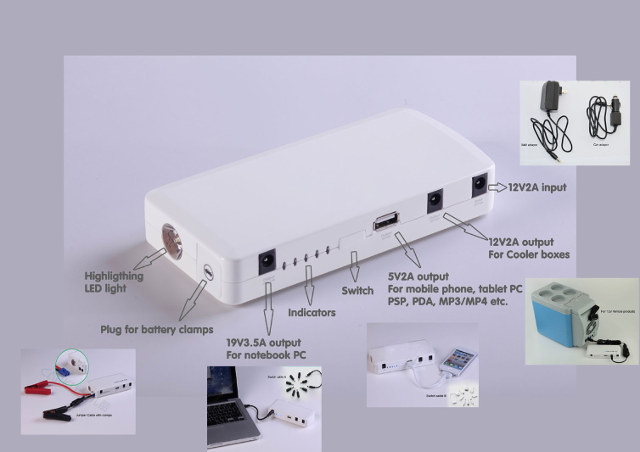YubiKey NEO is a dongle that supports both contact (USB) and contactless (NFC, MIFARE) communications to secure your Windows, Mac OS or Linux computers and/or Android/iOS smartphones using two factor authentication. It supports one-time password (OTP), smart card functionality (OpenGPG, PIV…), as well as FIDO Alliance’s Universal 2nd Factor (U2F) protocol. The key can be used in a variety of applications, such as logging into your computer, accessing gmail, github, dropbox, and other accounts, and disk encryption. It also works with password manager such as Lastpass or Dashlane. You’ll need to both enter your password, and connect the Yubikey to your computer to be able to login, and for NFC enabled smartphones, you’d need to tap the key on the device. In case you lose your key, online services usually have recovery mechanism in places, and some support registration of up multiple YubiKeys. The latter can probably be used for […]
The USB Type-C Authentication Specification Aims to Prevent Damage from Non-Compliant Cables and Adapters
The new USB Type-C standard is great, as cables are reversible so it does not matter if you connect them up or down, it can handle USB 3.1 data speed, as well as carrying video and up to 100W power thanks to USB-C power delivery. In theory all is great, but in practice, many USB-C cables are not compliant, and Benson Leung, a Google employee, has found that many USB-C cable sold on Amazon were not compliant, with even one damaging his Pixel 2 laptop and two USB PD analyzers. His reviews on Amazon, as well as customer complaints, probably lead the company to ban the sale of non-compliant cable or adapter, but to really mitigate the issue, a technical solution was needed, and that’s why the USB 3.0 Promoter Group has defined the Authentication Protocol for USB Type-C as part of the USB Power Delivery 3.0 specifications. Key […]
Lattice and Mediatek Announce superMHL Smartphone Reference Designs Supporting 4K over USB-C
Two standards are competing to bring 4K video output @ 60 Hz and 8K over USB type C connectors: DisplayPort 1.4 and superMHL. Lattice, who purchased Silicon Image last year, and Mediatek have collaborated to provide reference designs supporting superMHL and based on Helio X20 deca-core processor combined with Lattice components. Lattice SiI8348 MHL transmitter would handle 4K 60 fps video and MHL power, while Sil7033 USB type-C port controller would also handle USB 3.1 data transfer up to 10 Gbps, USB-C power delivery (PD), MHL Alt-mode on USB-C. Lattice also leverage their SiI7013 mobile USB Typer-C port controller, SiI9396 mobile superMHL/MHL to HDMI bridge, and other chips to offer accessories such as USB-C to HDMI adapters, MHL cables, USB-C charger, and USB-C dock with multiple USB ports and HDMI output. Anandtech notes that one the main problem with USB type C connector is likely to be the cable, as many […]
The First Devices and Routers with WiFi 802.11ad Delivering Up 7Gbit/s Transfer Rates at 60 GHz Will Be Available This Year
802.11ad is the latest and fastest WiFi standard working in the 60 GHz band and delivering up to 7 Gbit per second data transmission rates. The 60 GHz frequency band offers both advantages and disadvantages because it does not penetrate through walls nor water, meaning it can only be used within a room limiting the range, but at the same time it’s more secure since it cannot be snooped from the outside, and for people who worry about health effects it does not penetrate the human body. 802.11ad routers will also be able to switch to 2.4 and 5.0 GHz frequency bands in order to go through walls. The table above nicely summarize the key features of 802.11ad over 802.11ac and 802.11n, however the throughput row shows the theoretical maximum throughput, but in practice, using 802.11ac as example, clients are often limited to 433 or 866 Mbps, and distance and […]
Hubpixed is a Neat and CableFree USB Hub for the Raspberry Pi Zero (Crowdfunding)
While the Raspberry Pi Zero is not exactly broadly available, there are still several tenths of thousands who own, and I’ve seen several use a USB to OTG adapter combined to a USB hub to add USB devices such as a WiFi dongle, or/and keyboard. This works, but it’s quite messy. That’s why Vikas Shukla created Hubpixed USB hub for the Raspberry Pi that does not require any cables and cleverly uses the test pins on the back of the board for USB data and power. The board’s spring pins are the only electrical connections between Raspberry Pi Zero and the hub, with both boards attached with spacers, screws and bolts using the four mounting holes of RPi0. Vikas also showed the hub in action with a USB WiFi dongle. I’m not sure how it would fare with a USB hard drive however. Hubpixed is on Kickstarter, and has already exceeded […]
MeegoPad T09 Cherry Trail mini PC Features a USB Type C Port with DisplayPort, Data & Power Capabilities
MeegoPad T01 was one of the first Intel based TV Stick, having launched months before Intel’s own Compute Stick, and over the last couple of years, the company has introduced a dozen of Intel Bay Trail and Cherry Trail mini PCs and TV Sticks. MeegoPad has now unveiled three new Cherry Trail devices with MeegoPad T09, MeegoPad T10, and T05 Pro. While the last two models look more of the same with MeegoPad T10 mini PC, and MeegoPad T05 Pro TV stick powered by Intel Atom x5 processors with 2 to 4GB RAM, and 32 to 128 GB storage, I find MeegoPad T09 more interesting with a thin form factor with an Ethernet port, and a USB type C connector that supports data at USB 2.0 speeds, DisplayPort over USB-C, and USB Power Delivery. MeegoPad T09 specifications: SoC – Intel Atom x5-Z8300 or x5-Z8500 quad core processor with Intel 12EU […]
USB Power Delivery Advantages Explained (Video)
USB 3.0 and greater specifications not only promise higher speeds, up to 10Gbps for USB 3.1, but also the ability to deliver up to 100W over USB to power your laptop, display, and printer via equipment, usually a USB hub, that supports USB Power Delivery, or USB PD, via a USB Type C connector. So far very few products appear to support it, and I could only find the Macbook and ChromeBook Pixel, and a few USB PD chargers on Amazon. So basically in the future, the need for power supplies should decrease sharply, simplifying connections, and decreasing the cost of products and shipping since devices will only need a USB port that’s compatible with USB PD, meaning your computer, printer, and display won’t need an extra power supply as long as they consume less than 100 watts combined. The reasons I’m writing about this today, is that completely forgot […]
Multi-function Power Banks Can Jump Start Your Car Beside Charging Your Phone
Many people carry a USB power bank with them to make sure their smartphone does not run out of battery, but based on my experience failing to start your car because of a depleted or dead battery will bring ever more anxiety. Interestingly/funnily enough, while this happened to my neighbors last week-end, today I was informed that TM08 multi-function power bank was designed to both charge your phone or laptop, and help start your car. TM08 specifications: Input – 12V/1A Output – 5V-2A via USB and 12V jump starter for car with 200A starting current, and 400A peak current Battery Capacity – 12000mah Charging Time – 3 to 4 hours Life cycle – Over 1,000 cycles Dimensions – 130x70x25 mm Weight – 311 grams Operating Temperature – -20℃-85℃ The kit comes with adapters to charge your phone or other devices, as well as cables to connect to your car’s battery. […]


